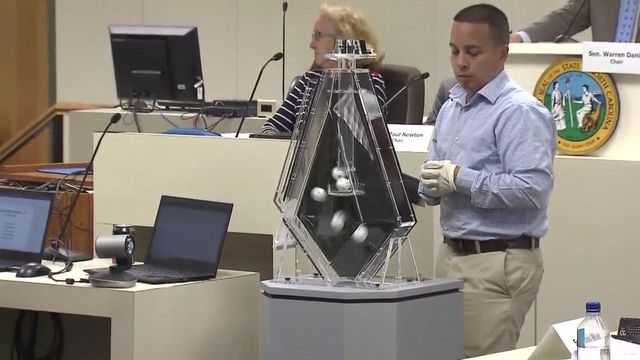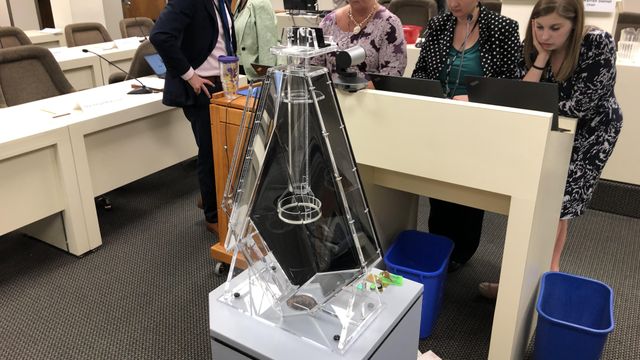In Senate redraw, lottery machine picks district maps at random
"Random number selection happens to be a specialty of the lottery," says Sen. Ralph Hise, R-Mitchell.
Posted — UpdatedThe unprecedented scene came after legislative staffers winnowed down a pack of 1,000 potential maps, drawn by a computer algorithm, to a handful of top contenders based on specific criteria.
Legislative staff spent much the day pulling the five maps that scored the best on a combination of compactness, fewest precincts split and fewest municipal boundaries split for each of seven clusters of counties that must be re-drawn, including one that includes the Senate district in Wake and Franklin counties.
At about 5:30 p.m., it was lottery time, and North Carolina Education Lottery officials loaded five balls – each weighed and certified by state officials in July – into a machine that blew one to the top. Committee Co-chairman Sen. Warren Daniel, R-Burke, announced which map the chosen number corresponding to.
An extra draw had to be completed after Sen. Natasha Marcus, D-Mecklenburg, noted that one of the top-scoring maps for a cluster of counties in southeastern North Carolina wasn't included.
Republican leaders said the lottery selection was used so no one can accuse them of choosing a map for political reasons.
Democrats, though, took issue with the set of 1,000 maps Republican used as a starting point, and they may offer amendments built off another set of maps as this process moves forward.
The N.C. House is redrawing its maps as well, but is a step or two behind the Senate after taking most of the day to verify, House leaders said, data that will eventually be used to score the 1,000 maps in a process similar to what the Senate used before the lottery machine was wheeled in.
Both chambers are working to meet a Sept. 18 court deadline to redraw close to half the state's General Assembly districts, which were found unconstitutional a week ago in a landmark decision on partisan gerrymandering.
Legislative staff planned to work late into the night Tuesday, and possibly Wednesday morning, loading the Senate's chosen maps into a software program so senators and the public can see the base map from which adjustments will be made.
In the House, a redistricting committee hearing got heated late in the day, when Rep. Zack Hawkins, D-Durham, asked whether it was appropriate for House Redistricting committee Chairman David Lewis, R-Harnett, to be part of the map-making process, since he was a named defendant in the lawsuit that necessitated the new maps – Common Cause v. Lewis.
Lewis tried to put the question to a vote, but Hawkins said he never intended for his query to be voted on and retracted it.
Both chambers are working off maps put forward in the lawsuit by Jowei Chen, a University of Michigan professor whose simulated maps and testimony helped prove the case against the current maps, which were drawn two years ago by the General Assembly's GOP majority. Common Cause, a left-leaning good government group, and the state's Democratic Party brought the case and hired Chen.
But though an expert for their side drew these maps, legislative Democrats say there's a fundamental flaw in using the set Republicans chose. Chen produced 1,000 maps that didn't take into account where incumbents live, then another 1,000 that did, avoiding double-bunking legislators and forcing them to run against each other to keep their seats.
Republicans in both chambers are using this second set to find their base maps.
State Sen. Natasha Marcus, D-Mecklenburg, and other Democrats said this will bake in problems with the old, unconstitutional maps, because the incumbents were elected from maps the courts have repeatedly called illegal gerrymanders. Before this latest case on partisan gerrymandering, older districts were declared illegal racial gerrymanders by the federal courts, leading to the 2017 redraw.
The old maps also protect incumbents who aren't in the legislature anymore, since they're based off legislators' addresses from 2011 and 2017. Marcus said that means nine former senators are included in the clusters of districts that the legislature has to redraw under the current court order.
In the House, Democratic Minority Leader Darren Jackson said there are at least 15 former members protected in the maps, and he questioned why Republicans are intent on using these maps.
"They picked one," Jackson said. "Why'd they pick that one? He had two sets of maps."
Marcus and other Democrats want the Senate committee to work off Chen's earlier set of maps, maps that didn't take incumbency into account at all, pick a base map from that universe, then amend it to avoid double-bunking current legislators. Republicans are holding fast to the second set, but told staff to work up the base maps that Democrats prefer, if time permits.
Both sides are concerned the other is trying to reverse engineer the process to come up with maps most beneficial to their party, or to an individual legislator's re-election chances. There were questions Tuesday about why the House paused its process for hours.
Lewis said his side's attorneys were reviewing the data behind Chen's maps, which Common Cause's legal team had provided, but he had no reason to doubt that data, which the Senate had already moved forward on.
"We've now taken a whole day where they're just behind closed doors," said Stanton Jones, lead attorney for Common Cause in the underlying court case. "Why?"
The judges in this case ordered unusual transparency, saying maps must be drawn in open meetings. They also said explicitly that legislators can't use past election results to design the new maps, but that information on Chen's maps was sent, by Republican attorneys in the case, to legislators on Monday, the first day of this redraw.
Jones and others quickly cried foul, and Lewis said no one completed the large data download before people realized what had been sent, and that it shouldn't be seen. Democrats largely held their peace on this issue Tuesday, but it remains a potential issue looming over this closely watched process.
"It came from the defendant's lawyer," said state Rep. Deb Butler. "And now you've put it in the hands of a larger group of people. ... For me, it typifies an irreverence."
As for the Chen maps, Republican leaders said the court has already blessed both sets of 1,000 maps, and that it makes sense to simply update the incumbent-protecting maps as needed.
Chen created the two sets to show that a nonpartisan process would repeatedly produce legislative districts friendlier to Democrats than the gerrymandered maps the GOP majority drew. He succeeded, and Republicans now argue that, since the court accepted that evidence, the court must agree these are legal maps, so they should be fine to work from.
“Were going to assume that the court knew what it was doing," Senate Elections and Redistricting Committee Co-Chairman Paul Newton, R-Cabarrus, said Tuesday.
But Chen himself, in his report to the court, testified that the second set of maps "could cause indirect partisan consequences." The point of drawing them, he said, was to see whether incumbency protection, as opposed to straight-up partisan gerrymandering, could account for the tilt in Republican-drawn districts.
"As this slate of incumbents is heavily Republican and was elected from previous versions of North Carolina's House districts, an attempt to protect all incumbents would, in general, encourage the drawing of a plan with districts somewhat similar to the pre-enacted districts from which these incumbents had been previously elected, thus indirectly distorting the partisan distribution of voters across districts," Chen wrote.
Later in the report, though, Chen noted that the "partisan distribution of seats" in both sets of 1,000 maps – the one that protected incumbents and the one that didn't – was "nearly identical"
Either way, Sen. Floyd McKissick, D-Durham, urged his Republican colleagues to use the "purest data" and go with Chen's initial set of 1,000 maps that don't account for incumbents. He and other Democrats said Republicans mischaracterized the court, which accepted Chen's maps as evidence, not as a basis for new maps.
Republicans said McKissick was welcome to offer map amendments for an up-or-down vote before the GOP-majority committee as this process goes forward.
The majority also shot down a proposed amendment Tuesday from Sen. Michael Garrett, D-Guilford, to petition the court to bring in Chen as an expert and draw a new set of maps.
———
Related Topics
• Credits
Copyright 2024 by Capitol Broadcasting Company. All rights reserved. This material may not be published, broadcast, rewritten or redistributed.






